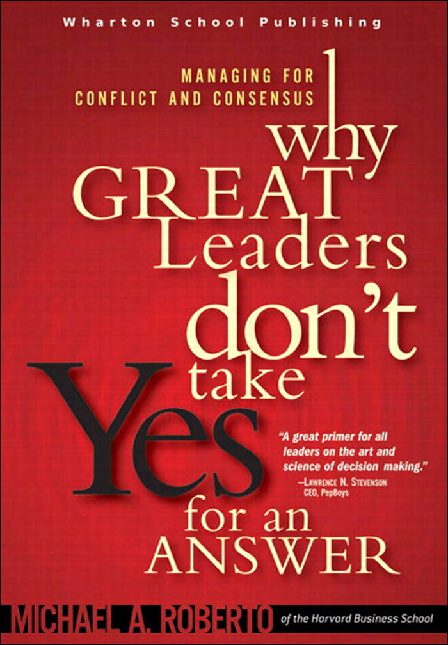summary
The book Why Great Leaders Don’t Take Yes for an Answer was written by Michael A. Roberto, who is a professor at Harvard Business School. It talks about how groups decide what to do. The book says that successful leaders encourage people to think critically and argue in a constructive way so that everyone doesn’t think the same way and can make better decisions.
Important Ideas and Themes:
The Risk of “Yes Men”:
Those who only listen to those who agree with them may make poor choices.
The Challenger disaster and business failures show how much it costs to keep people from speaking up.
How to Get People to Fight Well:
Roberto says that “task conflict,” which is when people don’t agree on ideas, is better than “personal conflict.”
Some effective methods for identifying less obvious risks include devil’s advocacy, red-teaming, and structured debates.
Creating a Culture of Questions:
Leaders should be humble, search for people who disagree with them, and make sure everyone feels safe.
Two tools for fostering this culture are anonymous feedback and “pre-mortems,” which involve considering potential problems that could arise.
Agreement doesn’t mean that everyone agrees.
Everyone being heard but not everyone agreeing is what true consensus means.
To avoid paralysis, leaders need to find a balance between being open to everyone and making decisions.
Real-World Frameworks and Examples:
It talks about both successes (like Lincoln’s cabinet) and failures (like Blockbuster’s decline).
It provides a set of guidelines for handling conflict and achieving consensus among team members.
Why It’s Important for Leaders: It provides a plan to steer clear of echo chambers and make decisions that will endure.
For Teams: It gives people the freedom to speak up without fear.
For businesses, it gives people the chance to think critically.
Praise: Harvard Business Review called it “essential reading for executives” because it combines academic rigor with useful advice.
Good for:
Those who aspire to become leaders, managers, or executives will find it beneficial. You will find it beneficial.
This material is beneficial for anyone seeking to gain a deeper understanding of how organizations function or the principles of decision science.
Important: Great leaders don’t want everyone to agree with them. They don’t want people to agree; they want them to think critically and disagree to find the best way to move forward.
